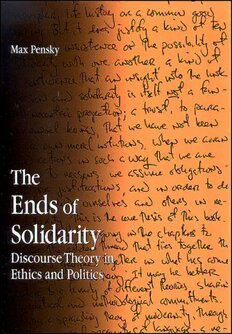
The Ends of Solidarity: Discourse Theory in Ethics and Politics PDF
278 Pages·2008·1.482 MB·English
Most books are stored in the elastic cloud where traffic is expensive. For this reason, we have a limit on daily download.
Preview The Ends of Solidarity: Discourse Theory in Ethics and Politics
Description:
Jürgen Habermas’s discourse theory demands that human beings see themselves in relations of solidarity that cross national, racial, and religious divides. While his theory has won adherents across a spectrum of contemporary debates, the required vision of solidarity has remained largely unexplored. In The Ends of Solidarity, Max Pensky fills this void by examining Habermas’s theory of solidarity, while also providing a comprehensive introduction to the German philosopher’s work. Pensky explores the impact of Habermasian discourse theory on a range of contemporary debates in politics and ethics, including the prospect of a cosmopolitan democracy across national borders; the solidarity demanded by the integration process in the European Union; the demands that immigration dynamics make on inclusive democratic societies; the divisive or unifying effects of religion in Western democracies; and the current controversies in genetic technology.
See more
The list of books you might like
Most books are stored in the elastic cloud where traffic is expensive. For this reason, we have a limit on daily download.
